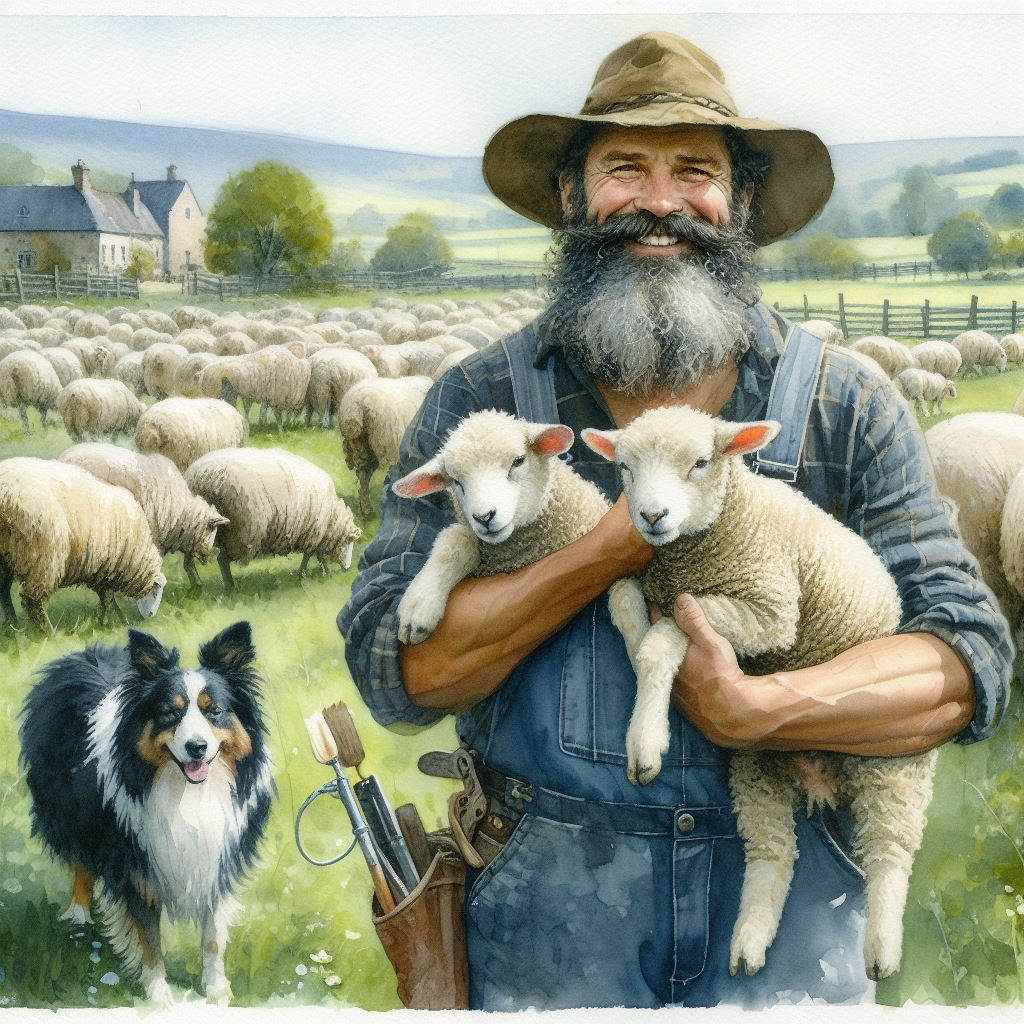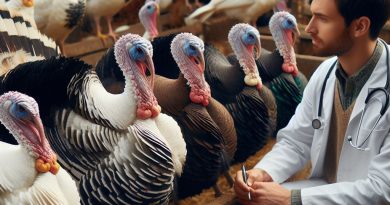Sheep Farming: Basics & Innovations
Last Updated on March 2, 2024
Introduction
Sheep farming is a traditional agricultural practice that has sustained communities for centuries.
This practice involves raising and breeding sheep for various purposes, including wool, meat, and milk production.
The importance and scope of sheep farming extend beyond its economic value. It plays a significant role in providing livelihoods to farmers and supporting rural economies.
Additionally, sheep farming contributes to sustainable agriculture practices and maintains ecological balance in certain regions.
The purpose of this blog post is to provide readers with a thorough overview of sheep farming, including the basics and innovative practices.
By highlighting the different aspects of quality sheep farming, this post aims to educate individuals interested in the agricultural industry or seeking to establish their own sheep farm.
Moreover, it will showcase the various techniques and advancements in this field, enabling readers to understand the potential for growth and better practices.
Throughout this blog post, we will explore topics such as breed selection, proper nutrition, disease prevention, and advanced technologies used in sheep farming.
By the end, readers will have a comprehensive understanding of sheep farming and its significance in today’s agricultural landscape.
Stay tuned for the next chapter, where we will delve deeper into breed selection and its impact on sheep farming success.
Read: Starting a Poultry Farm: Essential Steps & Tips
Basics of Sheep Farming
Definition and characteristics of sheep
Sheep are small, domesticated animals with woolly fur, commonly used for their meat, milk, and wool.
They are herbivores, belonging to the family Bovidae and the genus Ovis.
Sheep have a docile nature, making them easy to handle and manage.
Types of sheep breeds commonly used
- Meat breeds – such as the Suffolk and Hampshire sheep, are primarily raised for their meat production.
- Wool breeds – such as the Merino and Rambouillet sheep, are valued for their fine wool quality.
- Dual-purpose breeds – such as the Columbia and Clun Forest sheep, are bred for both meat and wool.
Basic needs of sheep
1. Shelter and housing
Sheep require a well-designed shelter that protects them from extreme weather conditions and predators.
The housing should have proper ventilation and adequate space to accommodate the flock comfortably.
2. Feed and nutrition
Sheep have specific dietary requirements and need a balanced diet consisting of hay, roughage, grains, and minerals.
Pasture grazing is essential for their overall health and should be supplemented with quality feed during non-grazing seasons.
3. Water requirements
Sheep need access to clean and fresh water at all times to meet their hydration needs.
Water sources should be easily accessible within the grazing area or the housing facility.
4. Healthcare and veterinary services
Regular check-ups, vaccinations, and deworming are crucial for maintaining the health and preventing diseases in sheep.
Consulting a veterinarian and implementing preventive healthcare measures is vital for ensuring the well-being of the flock.
Common challenges faced in sheep farming
- Predators – Sheep are vulnerable to attacks from predators such as wolves, coyotes, and dogs. Farmers need to implement effective fencing and predator control measures to protect their flock.
- Disease management – Sheep are susceptible to various diseases, including foot rot, internal parasites, and respiratory infections. Proper biosecurity measures, vaccination protocols, and regular monitoring are necessary to prevent and manage diseases.
- Environmental conditions – Extreme weather conditions, such as heatwaves or cold spells, can impact sheep health and performance. Adequate shelter, ventilation, and appropriate management practices are essential to mitigate the effects of harsh weather.
- Market fluctuations – The profitability of sheep farming is influenced by market demand, prices, and competition. Staying updated with market trends, establishing strong supply chains, and adapting marketing strategies are crucial for success.
In essence, sheep farming involves understanding the definition and characteristics of sheep, knowing the types of sheep breeds commonly used, providing for their basic needs, and overcoming challenges.
By addressing shelter, feed, water, healthcare, and common obstacles, sheep farmers can create a sustainable and profitable enterprise.
Read: Best Chicken Breeds for Backyard Farms in the US
Gain More Insights: Responsible Dairy Farming Tips
Sheep Farming Innovations
Introduction to innovative practices in sheep farming
Sheep farming has undergone significant advancements and innovations in recent years, revolutionizing the industry.
New practices and techniques have been developed to improve productivity, efficiency, and sustainability in sheep farming.
Advancements in sheep breeding techniques
Selective breeding and genetic improvements
Farmers now have the ability to selectively breed sheep to enhance desirable traits such as milk production, wool quality, and disease resistance.
This has led to the development of superior sheep breeds with improved performance and profitability.
Assisted reproduction techniques
Artificial insemination and embryo transfer methods have revolutionized the breeding process in sheep farming.
These techniques allow farmers to maximize the use of superior genetics and accelerate genetic progress in their flocks.
Technological advancements in sheep farming
Use of drones for monitoring and management
Drones equipped with cameras and sensors are now being used to monitor sheep flocks, detect diseases, and assess pasture conditions.
These aerial devices provide farmers with real-time information, enabling them to make informed decisions and improve flock management.
Automated feeding systems
Modern sheep farms are increasingly adopting automated feeding systems to ensure accurate and efficient feeding of the flock.
These systems can automatically distribute feed based on individual sheep requirements, optimizing nutrition and minimizing waste.
GPS tracking and monitoring devices
With the help of GPS technology, farmers can track the location and movement patterns of their sheep.
Monitoring devices attached to the animals can also collect vital data on behavior, health, and productivity.
Sustainable and eco-friendly practices in sheep farming
Pasture rotation and land management
Sheep farmers are implementing sustainable grazing practices, such as rotational grazing, to preserve and improve pasture quality.
This method helps prevent overgrazing, conserve soil fertility, and enhance biodiversity.
Alternative feed sources
Efforts are being made to explore alternative feed sources, such as forage crops or crop residues, to reduce reliance on conventional feeds.
This not only diversifies the diet of the sheep but also contributes to the management of natural resources.
Waste management and sustainability initiatives
Sheep farms are implementing efficient waste management systems to minimize environmental impact.
Composting, recycling, and utilization of manure as a natural fertilizer are common practices in sustainable sheep farming.
In fact, advancements in sheep farming innovations have greatly transformed the industry.
From selective breeding and assisted reproduction techniques to technological advancements and sustainable practices, sheep farmers now have the tools and knowledge to enhance the productivity, efficiency, and sustainability of their operations.
Read: Turkey Rearing 101: Basics for Beginners

Benefits and Challenges of Innovations
Innovations in sheep farming bring forth numerous benefits for farmers who are willing to embrace change and adapt to new technologies and practices.
These innovations not only improve productivity and efficiency but also contribute to disease prevention, animal welfare, and overall market competitiveness.
However, there are also challenges that need to be addressed when incorporating these innovations into existing sheep farming operations.
Benefits of implementing innovative practices
One of the most significant benefits of implementing innovative practices in sheep farming is the increase in productivity and efficiency.
Through the use of advanced technologies and management techniques, farmers can optimize their production processes, leading to higher yields and reduced costs.
This, in turn, translates to improved profitability for sheep farmers.
Innovations also play a crucial role in disease prevention and management in sheep farming.
New techniques for vaccinations, biosecurity measures, and disease monitoring systems help farmers identify and address health issues promptly.
By implementing these innovative practices, sheep farmers can minimize the spread of diseases and reduce their impact on the flock, resulting in healthier animals and better overall farm performance.
Furthermore, innovative practices significantly contribute to improved animal welfare in sheep farming.
Technological advancements, such as automated feeding systems, climate control mechanisms, and comfortable housing arrangements, ensure that sheep are provided with a conducive environment that meets their physical and behavioral needs.
By prioritizing animal welfare, farmers can enhance the overall quality of their products and build a positive reputation in the market.
Additionally, embracing innovations in sheep farming enhances market competitiveness and profitability.
Consumers today are increasingly conscious of where their food comes from and how it is produced.
By implementing innovative practices that align with sustainability and ethical standards, sheep farmers can differentiate themselves in the market and attract environmentally and socially conscious consumers.
This, in turn, opens up opportunities for premium pricing and long-term profitability.
Challenges in adopting and implementing innovations
Despite the numerous benefits, there are challenges associated with adopting and implementing innovative practices in sheep farming.
One significant challenge is the initial investment costs. Implementing new technologies and infrastructure often requires a considerable upfront investment, which can be a barrier for many farmers, especially small-scale operations.
Access to financial resources and support becomes crucial in overcoming this challenge.
Another challenge lies in the lack of technical knowledge and training among sheep farmers. Keeping up with rapidly evolving technologies and best practices can be overwhelming.
Access to training programs and knowledge-sharing platforms plays a vital role in enabling farmers to adopt and implement innovative practices effectively.
Collaboration between agricultural research institutions and industry stakeholders is crucial in disseminating knowledge and providing ongoing support.
Finally, there are potential risks and uncertainties associated with adopting and implementing innovative practices.
Farmers need to carefully assess and manage the risks associated with new technologies, market fluctuations, and changing consumer demands.
It is essential to conduct thorough feasibility studies and risk assessments before making significant investments in innovative practices.
In general, the benefits of implementing innovative practices in sheep farming are undeniable. However, it is crucial to acknowledge and address the challenges that come along with these innovations.
By providing financial support, promoting knowledge-sharing, and managing risks effectively, the sheep farming industry can fully realize the potential benefits of adopting and implementing innovative practices for long-term sustainability and success.
Read: Poultry Health: Preventing Common Diseases
Conclusion
Recap of the key points discussed
- Sheep farming is a lucrative industry with a long history of domestication.
- Basic sheep farming practices involve proper nutrition, housing, and health management.
- Innovations in sheep farming have revolutionized the industry, bringing about improved productivity and efficiency.
- New technologies such as automated feeding systems and precision farming have made sheep farming easier.
Importance of staying updated with innovations
Keeping up with new developments is crucial for sheep farmers to stay competitive in the market.
By adopting new techniques and technologies, farmers can enhance their productivity and profitability.
Encouragement for sheep farmers to explore modern practices
Sheep farmers should be open to learning and implementing innovative methods in their operations.
By actively seeking out new ideas, they can improve their farming practices and ultimately thrive.
Closing thoughts
Sheep farming is a dynamic industry that presents opportunities for growth through innovation.
Farmers who embrace new technologies and practices stand to benefit from increased efficiency and profitability.
It is essential for sheep farmers to constantly seek knowledge and adapt to the ever-evolving industry trends.
By doing so, they can secure a prosperous future for their farms and contribute to the sustainability of the sheep farming industry as a whole.


